View in other NatureServe Network Field Guides
NatureServe
Montana
Utah
Wyoming
Idaho
Wisconsin
British Columbia
South Carolina
Yukon
California
New York
Roundleaf Water-hyssop - Bacopa rotundifolia
State Rank Reason (see State Rank above)
A rare species known in Montana from only a few observations in the central and eastern portions of the state. However, the species is widely distributed and appears tolerant of brackish waters as well as some degree of nutrient enrichment. As such, it is unclear to what extent the species' viability is at risk in the state and whether it responds negatively to human-induced impacts to water quality. Additional populations of the species are likely to occur in Montana.
- Details on Status Ranking and Review
Population Size
Score1-3 - Very Small to Moderate: Population size is imprecisely known but is believed to be <100,000 individuals.
Range Extent
Score1 - Peripheral, Disjunct or Sporadic Distribution in MT: Widespread species that is peripheral, disjunct or sporadically distributed within MT such that it occurs in <5% of the state (<7,500 sq. miles or the combined area of Beaverhead and Ravalli Counties) or is restricted to 4-5 sub-basins.
Area of Occupancy
Score2 - Low: Generally occurring in 4-10 Subwatersheds (6th Code HUC’s).
Environmental Specificity
Score1 - Moderate: Species is restricted to a specific habitat that is more widely distributed or to several restricted habitats and is typically dependent upon relatively unaltered, good-quality habitat (C Values of 5-7).
Trends
ScoreNA - Rank factor not assessed.
CommentPopulation trends are unknown, though species could potentially be introduced to some sites or increasing in numbers.
Threats
Score0-1 - Low to Medium.
Intrinsic Vulnerability
Score0-1 - Low to Moderate Vulnerability.
Raw Conservation Status Score
Score
5 to 9 total points scored out of a possible 16 (Rarity factors and threats only).
General Description
Roundleaf Water-hyssop is a fibrous-rooted perennial herb with branched, succulent stems, 10-40 cm long, that float on the surface of the water and root in mud at the nodes. The broadly elliptic to circular leaves, 1-3 cm long, are sessile and opposite each other on the stems. Newer foliage is short and hairy. Flowers are borne on stalks, 5-20 mm long, arising from the axils of leaves. The cup-shaped, white flowers are 5-10 mm long and have 5 equal lobes above a united tube that is yellow inside. There are 4 small stamens. The calyx is composed of 5 separate sepals, one much broader than the others. Globose capsules, 3-6 mm high, contain numerous small seeds.
Phenology
Flowering and fruiting June-August.
Diagnostic Characteristics
Aquatic to emergent, glabrous, fibrous-rooted perennials. Stems prostrate, glabrous to puberulent, 5–25 cm, rooting at the lower nodes. Leaves opposite, sessile, obovate to orbicular, glabrous, 1–3 cm long. Inflorescence 1 to 4 pedicellate flowers at leaf nodes. Flowers: calyx 3–6 mm long, divided nearly to the base into 5 unequal lobes; corolla campanulate, white with a yellow throat, 5-lobed, barely irregular, 5–7 mm long; stamens 4; style 2-lobed. Capsule orbicular, 3–6 mm long, opening by 4 valves (
Lesica et al. 2012. Manual of Montana Vascular Plants. BRIT Press. Fort Worth, TX).
Species Range
Montana Range
Range Descriptions
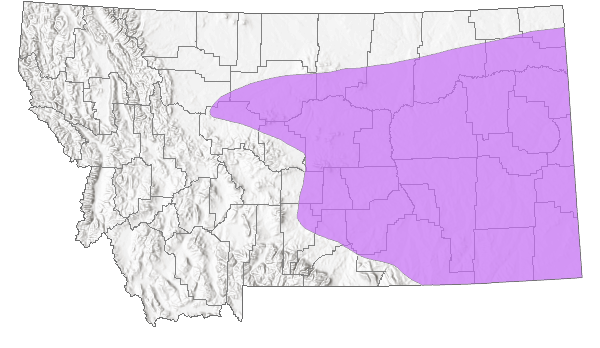
 Native
Native
Range Comments
MT to MN, south to CA, TX, LA and MS (Lesica et al. 2012. Manual of Montana Vascular Plants. BRIT Press. Fort Worth, TX).
Observations in Montana Natural Heritage Program Database
Number of Observations: 9
(Click on the following maps and charts to see full sized version)
Map Help and Descriptions
Relative Density
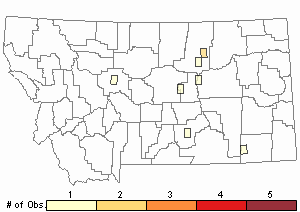
Recency
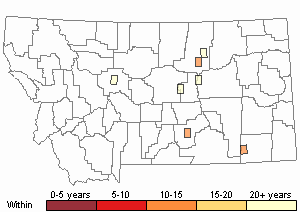
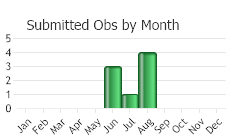
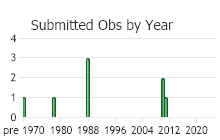
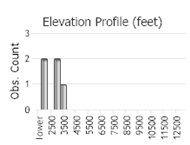 (Observations spanning multiple months or years are excluded from time charts)
(Observations spanning multiple months or years are excluded from time charts)
Habitat
Muddy shores of ponds and streams in the valleys and on the plains.
National Vegetation Classification System Groups Associated with this Species
Wetland and Riparian
Alkaline - Saline Wetlands
Riparian and Wetland Forest
Wet Meadow and Marsh
Open Water
Open Water
Stewardship Responsibility
Threats or Limiting Factors
STATE THREAT SCORE REASON
Threat impact not assigned because threats are not known (MTNHP Threat Assessment 2021).
References
- Literature Cited AboveLegend:
 View Online Publication
View Online Publication Lesica, P., M.T. Lavin, and P.F. Stickney. 2012. Manual of Montana Vascular Plants. Fort Worth, TX: BRIT Press. viii + 771 p.
Lesica, P., M.T. Lavin, and P.F. Stickney. 2012. Manual of Montana Vascular Plants. Fort Worth, TX: BRIT Press. viii + 771 p. MTNHP Threat Assessment. 2021. State Threat Score Assignment and Assessment of Reported Threats from 2006 to 2021 for State-listed Vascular Plants. Botany Program, Montana Natural Heritage Program, Helena, Montana.
MTNHP Threat Assessment. 2021. State Threat Score Assignment and Assessment of Reported Threats from 2006 to 2021 for State-listed Vascular Plants. Botany Program, Montana Natural Heritage Program, Helena, Montana.
- Additional ReferencesLegend:
 View Online Publication
View Online Publication
Do you know of a citation we're missing? Barrett, S.C.H., and J.L. Strother. 1978. Taxonomy and natural history of Bacopa (Scrophulariaceae) in California. Systematic Botany 3(4): 408-419.
Barrett, S.C.H., and J.L. Strother. 1978. Taxonomy and natural history of Bacopa (Scrophulariaceae) in California. Systematic Botany 3(4): 408-419. Dolan, R. W. 2004. Conservation Assessment for Roundleaf water-hyssop (Bacopa rotundifolia (Michx.) Wettst.). USDA Forest Service, Eastern Region.
Dolan, R. W. 2004. Conservation Assessment for Roundleaf water-hyssop (Bacopa rotundifolia (Michx.) Wettst.). USDA Forest Service, Eastern Region. Heidel, B.L. 1994. Sensitive plant species survey in Garfield and McCone Counties, Montana. Unpublished report to the Bureau of Land Management. Montana Natural Heritage Program, Helena, Montana. 58 pp. plus appendices.
Heidel, B.L. 1994. Sensitive plant species survey in Garfield and McCone Counties, Montana. Unpublished report to the Bureau of Land Management. Montana Natural Heritage Program, Helena, Montana. 58 pp. plus appendices. Lesica, P., M.T. Lavin, and P.F. Stickney. 2022. Manual of Montana Vascular Plants, Second Edition. Fort Worth, TX: BRIT Press. viii + 779 p.
Lesica, P., M.T. Lavin, and P.F. Stickney. 2022. Manual of Montana Vascular Plants, Second Edition. Fort Worth, TX: BRIT Press. viii + 779 p. Rundquist, V.M. 1973. Avian ecology on stock ponds in two vegetational types in north-central Montana. Ph.D. Dissertation. Bozeman, MT: Montana State University. 112 p.
Rundquist, V.M. 1973. Avian ecology on stock ponds in two vegetational types in north-central Montana. Ph.D. Dissertation. Bozeman, MT: Montana State University. 112 p.
- Web Search Engines for Articles on "Roundleaf Water-hyssop"





